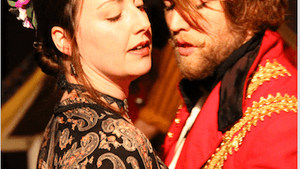Stay in the Loop
BSR publishes on a weekly schedule, with an email newsletter every Wednesday and Thursday morning. There’s no paywall, and subscribing is always free.
Condensed, but full strength
EgoPo Classic Theater presents Brenna Geffers's 'Anna'

Forgive me for my skepticism about turning "the greatest novel ever written," Leo Tolstoy's Anna Karenina, all 864 pages of it, into a two-hour play. I should have trusted my better instincts, which said that director Brenna Geffers and EgoPo Classic Theater would pull it off.
They do, splendidly, with just eight actors (who also collaborated on the adaptation); Aaron Cromie's inventively simple set of rugs, tents, and trees; J. Dominic Chacon's romantic, shadowy lighting; and Natalia de la Torre's beautiful bohemian costumes, which place the characters somewhere between 1870s Russia and 1960s San Francisco while vividly expressing every character's personality.
Solid storytelling
Each actor also narrates, slipping easily from playing roles to speaking in third person about their characters and the story. This device makes Anna easy to follow even for those who have not read Anna Karenina. Colleen Corcoran plays the title character, who falls in love at first sight with flamboyant playboy Count Vronsky (Andrew Carroll). It's a beautifully realized event in words and staging when Anna and Vronsky's eyes meet and they recognize their mutual attraction, with Vronsky describing the moment as it occurs.
Anna is married, alas, and subject to social rules and moral laws. She cannot leave her husband Karenin (Carlo Campbell), and cannot function in society as Vronsky's mistress. Meanwhile, wealthy Levin (Arlen Hancock) loves Princess Kitty (Maria Konstantinidis), who so wants Vronsky that she falls ill. Shamus Hunter McCarty, Lee Minora, and Amanda Schoonover play multiple roles; the ensemble stays on stage, sometimes adding songs and sounds and becoming trains and furniture.
While the novel investigates many Russian societal and political issues, Anna focuses on personal relationships and the larger oppression of women. Scoonover's Dolly is tortured by her husband's infidelities, and Kitty's and Anna's marriages become prisons in different ways. "He has never thought of me as a living, breathing person," Anna realizes about Karenin. Infidelity could ruin "fallen woman" Anna, but is accepted behavior for husbands.
Leap into the present
The fast-paced epic story engrosses, often with humor, and the actors perform with sincerity and poise. They flip from one task to another with seeming ease, playing heartwrenching scenes, then switching characters, narrating, or representing objects. The play's ending is a surprise, even though most people (like me) have absorbed enough about Anna Karenina through life. It's embedded in our culture, like Hamlet. But Geffers and company add a modern twist that makes women's subjugation in 1870s Russia feel suddenly relevant and familiar in 2017.
The play's final minute contains a grand dramatic gesture, much like Anna itself, which skillfully knits Geffers's theatrical audacity with a classic story and a modern issue. The other day, an acquaintance complained to me that theater produces too many old stories. I can counter with Anna, which shows how a familiar old tale can be a refreshingly new theatrical experience offering wisdom about contemporary problems.
What, When, Where
Anna. By Brenna Geffers and the ensemble; Brenna Geffers directed. EgoPo Classic Theater. Through April 16, 2017, at the Latvian Society Theater, 531 N. 7th Street, Philadelphia. (267) 273-1414 or egopo.org.
Sign up for our newsletter
All of the week's new articles, all in one place. Sign up for the free weekly BSR newsletters, and don't miss a conversation.

 Mark Cofta
Mark Cofta